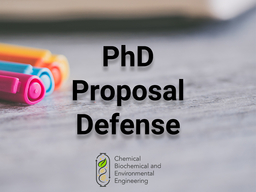Zahra Ghassemi : PhD Proposal Defense
FORMAT: VIRTUAL PRESENTATION
Location
Online
Date & Time
June 26, 2020, 10:00 am – 1:00 pm
Description
Preservation of Protein Stability and Activity by Confinement in Hydrogels
Zahra Ghassemi, PhD Student
Advisor: Dr. Jennie Leach
ABSTRACT:
A robust formulation for preserving the structure and stability of protein therapeutics against instabilities is a challenge in biopharmaceutical industries. The production of protein-and peptide-based drug therapies has significantly increased over the last 20 years. However, they pose unique challenges due to their low stability as compared to small molecule drugs. Unfolding and aggregate formation can occur in almost every biopharmaceutical process, ranging from production, purification, formulation, storage, transportation, delivery, to in vivo administration with current systems formulated as a liquid solution or suspension, or lyophilized product. Therefore, it is critical to consider factors that influence protein structure and stability in every stage of biopharmaceutical development and production.
Hydrogels provide unique advantages towards the study of protein structure and stability due to confinement. Confinement favors the native structure of the folded protein. When a protein embedded within a hydrogel, protein chain mobility is limited vs in free solution. This limited mobility may contribute towards preserving the protein structure, and improving the pharmacology of the protein without changing its efficacy. Further, hydrogels are an appealing drug delivery system due to their physical similarities to native tissue as well as their biocompatibility.
The overall goal of the proposed studies is to demonstrate the effect of denaturant on the protein's structure and activity embedded in PEG hydrogel. My hypothesis is that the homogenous confinement that exists in a PEG hydrogel better preserves the native folded state vs. a buffer solution and an optimal mesh size exists that is correlated to gyration radius of the protein. To test the hypothesis, Aim 1 experiments will be conducted on different model proteins to define the hydrogel mesh size (or optimal hydrogel) that provides better stabilization for the protein vs buffer solution. The basis for protein-hydrogel interactions that drive protein stability will be investigated in greater mechanistic detail in Aim 2. Aim 3 experiments will focus on the stabilization of monoclonal IgG1 as a model therapeutic protein via optimization of hydrogel confinement. The results of these studies will enable a better experimental understanding of protein confinement, and may lead to improved means of storing protein therapeutics.
Agenda:
1 hr presentation will be open to the public with Q&A. Followed by a closed session with the committee and PhD Student.
Meeting link:
